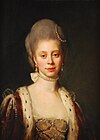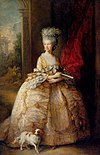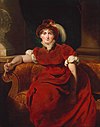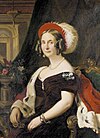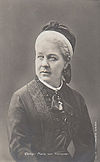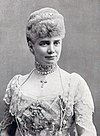
The British royal family comprises Queen Elizabeth II and her close relations. There is no strict legal or formal definition of who is or is not a member of the British royal family. Many members support the Queen in undertaking public engagements and often pursue charitable work and interests. The royal family are regarded as British cultural icons.

The House of Hanover, whose members are known as Hanoverians, is a German royal house that ruled Hanover, Great Britain, and Ireland at various times during the 17th to 20th centuries. The house originated in 1635 as a cadet branch of the House of Brunswick-Lüneburg, growing in prestige until Hanover became an Electorate in 1692. George I became the first Hanoverian monarch of Great Britain and Ireland in 1714. At Queen Victoria's death in 1901, the throne of the United Kingdom passed to her eldest son Edward VII, a member of the House of Saxe-Coburg and Gotha. The last reigning members of the House lost the Duchy of Brunswick in 1918 when Germany became a republic.
A prince consort is the husband of a queen regnant who is not himself a king regnant in his own right. In recognition of his status, a prince consort may be given a formal title, such as prince or prince consort, with prince being the most common. However, most monarchies do not have formal rules on the styling of princes consort, thus they may have no special title. Few monarchies use the title of king consort for the same role.

The House of Welf is a European dynasty that has included many German and British monarchs from the 11th to 20th century and Emperor Ivan VI of Russia in the 18th century.

George V was the last King of Hanover, the only child and successor of King Ernest Augustus. George V's reign ended during the unification of Germany.

Ernest Augustus, Crown Prince of Hanover, 3rd Duke of Cumberland and Teviotdale, was the eldest child and only son of George V of Hanover and his wife, Marie of Saxe-Altenburg. Ernst August was deprived of the thrones of Hanover upon its annexation by Prussia in 1866 and later the Duchy of Brunswick in 1884. Although he was the senior male-line great-grandson of George III, the Duke of Cumberland was deprived of his British peerages and honours for having sided with Germany in World War I. Ernst August was the last Hanoverian prince to hold a British royal title and the Order of the Garter. His descendants are in the line of succession to the British throne.

Ernest Augustus was the reigning Duke of Brunswick from 2 November 1913 to 8 November 1918. He was a grandson of George V of Hanover, whom the Prussians had deposed from the Hanoverian throne in 1866, and Christian IX of Denmark.

Duchess of Kent is the principal courtesy title held by the wife of the Duke of Kent. There have been four Duchesses of Kent since the title's creation. The current duchess is Katharine, whose husband Prince Edward, inherited the dukedom on 25 August 1942 upon the death of his father Prince George, the son of George V.

The Titles Deprivation Act 1917 is an Act of Parliament of the United Kingdom which authorised enemies of the United Kingdom during the First World War to be deprived of their British peerages and royal titles.

Prince of the United Kingdom of Great Britain and Northern Ireland is a royal title normally granted to sons and grandsons of reigning and past British monarchs. The title is granted by the reigning monarch, who is the fount of all honours, through the issuing of letters patent as an expression of the royal will.

Ernst August, Hereditary Prince of Brunswick, Prince of Hanover was head of the House of Hanover from 1953 until his death. From his birth until the German Revolution of 1918–1919 he was the heir apparent to the Duchy of Brunswick, a state of the German Empire.

Princess Victoria Louise of Prussia was the only daughter and the last child of German Emperor Wilhelm II and Augusta Victoria of Schleswig-Holstein. She was a great-granddaughter of Queen Victoria through her father. Her 1913 wedding to Prince Ernest Augustus of Hanover was the largest gathering of reigning monarchs in Germany since German unification in 1871, and one of the last great social events of European royalty before the First World War began fourteen months later.

The Lady of the Bedchamber is the title of a lady-in-waiting holding the official position of personal attendant on a British queen or princess. The position is traditionally held by a female member of a noble family. They are ranked between the First Lady of the Bedchamber and the Women of the Bedchamber. They are also styled Gentlewoman of Her Majesty's Bedchamber.

Princess Augusta Frederica of Great Britain was a British princess, granddaughter of King George II and the only elder sibling of King George III. She was the duchess of Brunswick-Wolfenbuttel by marriage to Charles William Ferdinand, Duke of Brunswick. Her daughter Caroline was the spouse of King George IV.
Suo jure is a Latin phrase, used in English to mean 'in his own right' or 'in her own right'. In most nobility-related contexts, it means 'in her own right', since in those situations the phrase is normally used of women; in practice especially in England a man rarely derives any style or title from his wife, although this is seen in other countries when a woman is the last heir of her line. It can be used for a male when such male was initially a 'co-lord' with his father or other family member and upon the death of such family member became the sole ruler or holder of the title "in his own right" (Alone).
Duchess of Cumberland is the principal courtesy title held by the wife of the Duke of Cumberland. So far only one woman has been Duchess of Cumberland alone but another has been Duchess of Cumberland & Strathearn and three more have been Duchess of Cumberland & Teviotdale. The latter title has been vacant since the dukedom's suspension in 1919.
This page is based on this
Wikipedia article Text is available under the
CC BY-SA 4.0 license; additional terms may apply.
Images, videos and audio are available under their respective licenses.


